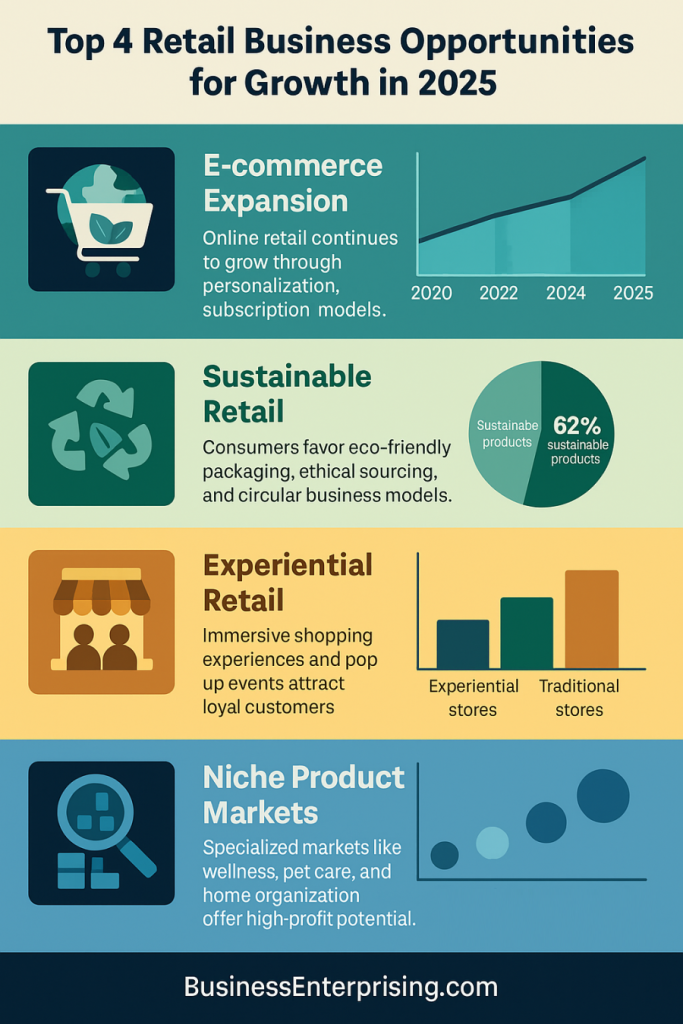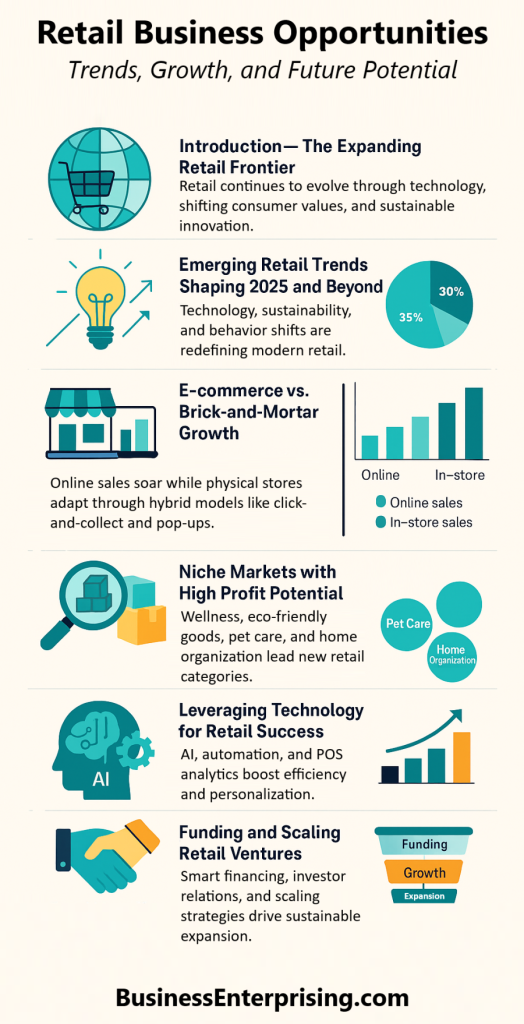
You now operate in a market defined by convenience, personalization, and sustainability. Customers want meaningful experiences and products that reflect their values. Additionally, they expect seamless service across both online and in-store channels. These changes have forced retailers to rethink traditional models and adopt new approaches that support faster, more flexible operations. Therefore, your ability to adapt to these expectations directly influences long-term success.
Technology continues to reshape every area of retail, from inventory management to customer engagement. Artificial intelligence, automation, and data analytics give you valuable insights into shopping behaviors and future trends. Additionally, tools that personalize marketing and simplify purchasing create stronger connections between you and your customers. Therefore, businesses that use data-driven decision-making often outperform competitors who rely on instinct alone.
The retail industry remains full of opportunity for those who stay curious and proactive. You can grow faster by combining innovation with strategic execution. Additionally, focusing on customer experience, sustainable practices, and smart technology investments helps build a resilient brand. Retail continues to evolve, and the possibilities for success are expanding for those ready to act with purpose and insight.
Emerging Retail Trends Shaping 2025 and Beyond
Technology, sustainability, and consumer expectations are reshaping how you approach retail. The pace of change continues to accelerate, and successful retailers are adapting quickly. You now compete in a space where convenience, personalization, and transparency matter more than ever. Customers expect faster service, smarter recommendations, and greener operations.
Technology has become central to how you connect with shoppers. Artificial intelligence and automation personalize the buying experience, while predictive analytics help you manage inventory efficiently. Additionally, many retailers now use virtual and augmented reality to enhance product discovery. These tools create smoother shopping experiences both online and in physical stores. Therefore, technology no longer supports retail—it defines it.
Sustainability has also moved from a trend to a standard practice. Consumers want brands that minimize waste and use ethical sourcing. Therefore, retailers are rethinking packaging, supply chains, and materials. Many businesses are adopting circular models, offering trade-ins or resale programs. This approach builds trust and keeps customers loyal over time.
Consumer behavior continues to evolve rapidly. People expect brands to reflect their values and deliver convenience across multiple channels. Additionally, social commerce and influencer-driven purchasing now shape retail decisions. The combination of technology, sustainability, and values-driven marketing creates powerful new retail business opportunities. When you adapt to these expectations, you stay relevant and competitive.
E-commerce vs. Brick-and-Mortar: Where the Real Growth Lies
E-commerce continues to expand rapidly, offering unmatched reach and flexibility for your business. Consumers enjoy shopping anytime and anywhere, which makes digital platforms a powerful growth driver. Additionally, online stores require fewer overhead costs and provide access to global audiences. Therefore, many brands have shifted their focus toward online channels to meet rising customer expectations.
However, physical retail still holds strong advantages that digital stores cannot replace. Customers value personal interaction, product testing, and immediate gratification. Many shoppers enjoy visiting stores for the experience, not just the transaction. Additionally, brick-and-mortar locations build trust through face-to-face engagement and sensory appeal. These factors explain why physical retail continues to adapt rather than disappear.
The strongest growth now lies in hybrid strategies that merge both channels. Click-and-collect models give your customers flexibility by allowing online orders with in-store pickup. Therefore, this approach drives traffic to physical stores while maintaining digital convenience. Pop-up shops also help you test new products, markets, or seasonal promotions without long-term commitments. Additionally, these temporary spaces create buzz and build brand awareness.
When digital tools integrate with in-person experiences, your business gains more control and insight. Data from both channels supports smarter decisions about inventory, pricing, and marketing. Therefore, the future of retail depends on blending online efficiency with physical connection. The brands that master this balance will uncover the most rewarding retail business opportunities.
Niche Markets with High Profit Potential
Niche markets continue to create strong opportunities for growth and differentiation. Consumers increasingly want products that reflect personal values and support healthier, more sustainable lifestyles. Therefore, smaller brands with targeted offerings often outperform larger competitors by focusing on authenticity and connection. You can find profitable opportunities by paying attention to how people live, work, and care for themselves.
Wellness products have become one of the fastest-growing segments. People are spending more on supplements, stress relief, and self-care tools that improve daily routines. Additionally, the demand for holistic and natural products keeps rising as shoppers prioritize long-term well-being. Retailers who focus on quality and trust can build loyal customer bases that value consistency and integrity.
Eco-friendly goods also continue to expand. Shoppers now expect transparency about sourcing, packaging, and materials. Therefore, businesses that promote sustainability through reusable, recyclable, or ethically made products gain attention and loyalty. The same applies to home organization products. Many consumers seek practical solutions to simplify living spaces, creating ongoing demand for storage, shelving, and space-saving items.
Pet supplies represent another lucrative niche. Spending on pet care, nutrition, and accessories continues to rise across all demographics. Additionally, pet owners treat animals like family members, increasing willingness to spend on premium goods. Together, these segments reflect powerful retail business opportunities. When you align your brand with meaningful niches, you build lasting relevance and steady profit potential.
Leveraging Technology for Retail Success
Technology now defines how you operate and compete in retail. Artificial intelligence and automation have transformed the way you manage customer relationships and inventory. These tools allow faster decision-making and create smoother shopping experiences. Additionally, they reduce costs and free up time to focus on service and innovation. Therefore, technology is not only an advantage but also a necessity for sustainable growth.
AI-powered insights help you understand what customers want before they do. Predictive analytics track buying patterns and guide smarter merchandising decisions. Additionally, these systems recommend products that match personal preferences, increasing satisfaction and repeat purchases. When you use AI to personalize communication and promotions, you strengthen loyalty and boost conversions.
Automation also improves accuracy and consistency in daily operations. It handles repetitive tasks like order processing, restocking, and delivery tracking. Therefore, automation helps maintain speed and quality while allowing your team to focus on higher-value work. Additionally, point-of-sale analytics give you real-time data to adjust pricing, manage promotions, and monitor sales trends. These insights make your business more responsive and profitable.
Technology also connects digital and in-store experiences through mobile apps, loyalty systems, and virtual assistants. Therefore, your customers experience convenience and personalization at every touchpoint. When used strategically, these tools expand retail business opportunities. They allow you to stay competitive, build stronger relationships, and meet customer expectations more effectively.
Franchise and Licensing Opportunities in Retail
Franchising continues to attract entrepreneurs who want structure and support when entering retail. It offers a business model that combines independence with proven systems. Additionally, franchise owners benefit from brand recognition, supplier relationships, and established marketing strategies. Therefore, the risk of failure is lower compared to launching a new concept from scratch.
Licensing opportunities share many of the same advantages. You can operate under a recognized brand while keeping more control over daily operations. Additionally, licensing arrangements often have lower fees and fewer restrictions, which appeals to experienced operators. Both models allow faster entry into competitive markets and reduce the uncertainty that comes with new ventures.
Selecting the right brand requires research and alignment with your goals. You should consider the company’s reputation, training programs, and long-term profitability. Additionally, understanding ongoing fees and regional market demand helps you make smarter decisions. Therefore, choosing a brand that fits your experience and financial capacity sets you up for long-term success.
Franchising and licensing also create scalable retail business opportunities. They allow expansion without building new systems or starting from zero. Additionally, you can diversify your portfolio by investing in multiple brands or regions. This approach builds stability and spreads risk across different markets. When you choose wisely, franchising offers the structure you need and the flexibility to grow with confidence.
Funding and Scaling Retail Ventures
Funding a retail venture requires strategy, timing, and clear financial planning. You need capital to cover product development, marketing, and operations. Additionally, your funding approach determines how quickly you can grow and how much control you maintain. Therefore, understanding financing options helps you build a foundation for scalable success.
You can begin with personal savings, small business loans, or crowdfunding to launch your concept. Additionally, investors often look for strong business models, consistent revenue potential, and well-defined growth plans. They want evidence that your brand can perform under real market conditions. Therefore, presenting accurate financial projections and a clear use of funds builds investor confidence.
As your business gains traction, scaling becomes the next challenge. You may expand through new locations, e-commerce channels, or strategic partnerships. Additionally, improving supply chain efficiency and adopting technology helps maintain profitability during rapid growth. International expansion brings more opportunity, but it requires cultural understanding, local compliance, and reliable distribution. Therefore, each new market should align with your brand’s strengths and resources.
Funding and scaling go hand in hand with long-term planning. Your ability to adapt, measure results, and reinvest wisely defines your success. Additionally, combining local growth with global reach strengthens stability and opens new retail business opportunities. With careful planning and disciplined execution, your venture can grow sustainably across markets and achieve lasting profitability.
Conclusion
Retail continues to evolve faster than most industries, creating new possibilities for you to grow and adapt. Technology, consumer behavior, and sustainability now influence every aspect of how you plan and operate. Additionally, innovation continues to drive efficiency and shape customer expectations across both physical and digital channels. Therefore, understanding where your business fits within these shifts helps you stay competitive.
You can find success by focusing on measurable goals and adaptable strategies. Every decision, from financing to customer engagement, affects long-term growth. Additionally, brands that respond quickly to trends often outperform those that rely on outdated methods. Therefore, continuous learning and experimentation are key to staying relevant in a dynamic market.
Retail success depends on balancing creativity with data-driven decisions. You should invest in technology that improves your efficiency and strengthens your customer relationships. Additionally, maintaining quality and consistency builds trust that supports repeat sales and word-of-mouth growth. Therefore, retailers who act with purpose and discipline often achieve steady, lasting progress.
The future holds expanding retail business opportunities for those ready to think differently. You can leverage digital innovation, sustainability, and customer insight to reach new audiences and markets. Additionally, every improvement you make, big or small, moves your business toward greater stability and growth. When you commit to consistent improvement, your brand becomes stronger, more efficient, and positioned for long-term success.


